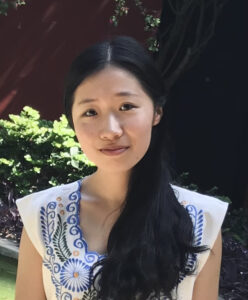
Xu (Elsie) Yan is a doctoral candidate in Penn State’s Clinical Child Psychology program. Her primary mentor is Cynthia Huang-Pollock, Ph.D. Elsie’s research centers on understanding how individual differences in cognition and affective processes contribute to maladaptive behaviors. In particular, her recent work has focused on a multi-method examination of attentional control deficits across substance use problems and psychopathologies.
Elsie received her Bachelor of Arts degree in honors psychology with a minor in statistics from McGill University. She received her Master of Science degree in clinical psychology at Penn State. Working with Cynthia Huang-Pollock, Elsie has been developing expertise in computational modelling of cognitive control and executive functioning. The title of her master’s thesis was “Preferential Choice to Exert Cognitive Effort in Children with ADHD: A Diffusion Modelling Account,” which was published in Research on Child and Adolescent Psychopathology, one of the leading developmental psychopathology journals. Her work was the first to identify that the atypical determination of effort allocation value among low-performing children was largely due to atypical sampling of the experience of effort. Elsie was subsequently awarded a two-year training fellowship in the T32 Prevention and Methodology Training Program funded by the National Institute on Drug Abuse and housed within the Edna Bennett Pierce Prevention Research Center. In this fellowship, Elsie worked with Emily Ansell, Ph.D., on the association between cognitive/attentional control and longitudinal outcomes in substance use. The fellowship provided Elsie with career development training, including grant writing, and interdisciplinary collaboration. For her comprehensive project, Elsie has been working with Cynthia Huang-Pollock and Steve Wilson, Ph.D., to examine how brain functional network dynamics support shifting attentional priorities under varying cognitive and affective demand, with a particular focus on the implications for nicotine withdrawal. Elsie’s dissertation will focus on the neurocognitive mechanisms of attention difficulties in adolescent depression and anxiety.
The Strumpf Scholar Award will support the advancement of Elsie’s training goals by enabling dedicated research time and the ability to attend computational psychiatry and neuroscience conferences for exposures to cutting-edge methodologies and networking opportunities. Additionally, Elsie plans to closely collaborate with Alexander Weigard, Ph.D., at the University of Michigan, who is a 2015 Strumpf Scholar recipient and expert in advanced modeling and neuroimaging. Elsie’s long-term goal is to develop into an independent clinical scientist who brings advanced methodology in model-based cognitive neuroscience to bridge knowledge gaps in clinical practice and improve intervention effectiveness for mental health conditions.